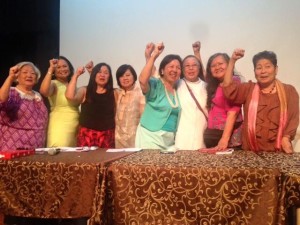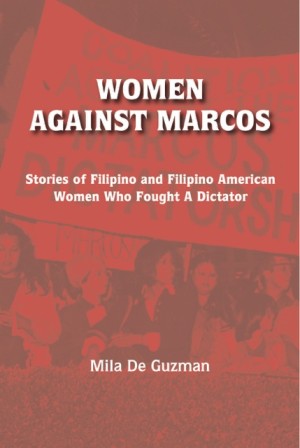‘Women Against Marcos’

Mila De Guzman (4th from left) with fellow activists at the February 23 launch of “Women Against Marcos” at Bantayog ng Mga Bayani. PHOTO BY LENI MARIN
Whenever I paint a picture in my mind of the Filipinos who led the fight against the Marcos dictatorship, women always occupy a prominent place in the portrait.
The central role women played in the fight against the Marcos dictatorship was clear to me even when I was still a boy.
I was eight when Marcos seized power by declaring martial law, an event that hit home.
My two eldest sisters went underground after martial law, giving up the creature comforts of middle class life to join what was most definitely a very unfashionable and very dangerous struggle.
I spent nearly a year of my life when I was around 10 visiting one of them, Nymia Simbulan (now a UP Manila vice chancellor), when she was detained at Fort Bonifacio, in the area where the fancy shops of Bonifacio Global City are now located.
Article continues after this advertisementAnd as a teenager, one of my responsibilities was to wait for a call from my other sister, Janet Paredes (now a leading expert in acupuncture and Chinese traditional medicine), to find out where I’m supposed to pick her and her family up so they could spend Christmas with us at home.
Article continues after this advertisementWhen I personally became politically involved, to follow my sisters’ lead in the struggle against dictatorship, women also played a role.
My very first political rally was a Human Rights Day protest in 1982 in front of Camp Aguinaldo. It was organized and led by women writers and journalists who by then had become the most outspoken opponents of the regime.
In the mural in my mind of the people who fought Marcos, women occupy a prominent place.
Mila De Guzman’s new book, “Women Against Marcos: Stories of Filipino and Filipino American Women Who Fought A Dictator,” underscores this. The book features the recollections and insights of seven women (including De Guzman) who contributed in unique ways to defeating the dictatorship.
One of them is my friend, the writer Aida Santos, a former political prisoner who recalls she cruelty and abuse endured by thousands: “I continued to witness the streams of people, including a blindfolded woman, being taken into our building. The cries of detainees being tortured in the middle of the night intensified my dread of what loomed ahead.”
As with other activists, fighting Marcos became a family affair for Aida.
“During my detention, the military did not spare my relatives, placing my entire family under surveillance and at times threatening to take my daughter away. They arrested my father, who had also become involved in the movement, and tortured him while he was in jail. As someone who grew up in poverty, he began to understand my reasons for becoming an activist, and decided to participate in the opposition to Marcos.”
De Guzman wrote the book partly in reaction to a troubling reality: Many Filipinos either do not remember or have never known about the abuses under Marcos.
“Young Filipinos who did not experience martial law do not have a collective memory of that era,” she says. “Many who lived through those times have become so frustrated by the worsening graft and corruption that they have expressed openness to some form of iron rule. Some former activists have even questioned whether their years of fighting Marcos were worth it.”
They were worth it.
De Guzman’s book is a powerful reminder of the repression and the cruelty during a time when a dictator felt he could get away with anything.
“Under martial law, tens of thousands of activists were arrested and detained and countless tortured and murdered; women prisoners were raped, subjected to other forms of sexual violence, and killed. Besides clamping down on all civil liberties, the totalitarian state used all branches of its military to spy on citizens and suppress dissent. Soldiers forcibly seized suspected opposition members from their homes and put them in prison camps … Some of the best and brightest young Filipinos simply disappeared after being taken by the military and later found ‘salvaged’ …”
And “Women Against Marcos” underscores how many others, led by women activists in the Philippines and the United States, fought back and helped blaze the trail to ending the nightmare.
“May their stories inspire this generation and future generations of Filipino and Filipino American women,” De Guzman says. “And may everyone always remember to resist any attempt to repeat a repressive past anywhere in the world with a resounding, ‘Never Again!’”
“Women Against Marcos” will be launched on April 1 at 6 p.m. at the Philippine Consulate in San Francisco at 447 Sutter St., San Francisco.
Visit the Kuwento page on Facebook at www.facebook.com/boyingpimentel
On Twitter @boyingpimentel
